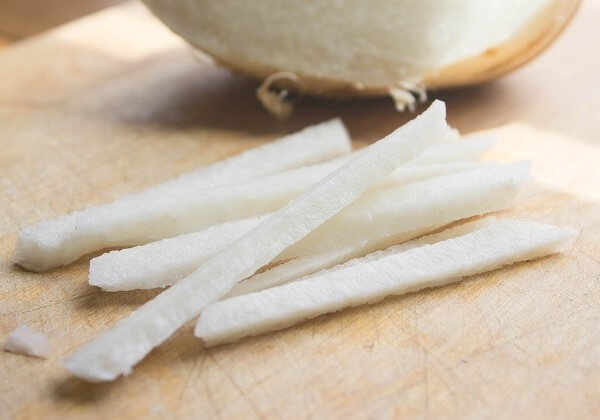
Using shredded Jicama or Jicama sticks in your potato salad is a smart and healthy choice for humans, but is it good or safe for doggy consumption? Before you hand over some Jicama to your dog, you’ll want to read this guide first to find out if dogs can safely eat Jicama.
Can dogs eat Jicama? Yes, dogs can eat Jicama as long as they only eat the bulbous root and not the skin. Jicama skin and other parts of its plant contain a toxic chemical called Rotenone. While Jicama itself isn’t harmful, it’s still not a natural food for dogs, and you should feed it to them in moderation.
Table of Contents
Can dogs have Jicama?

Dogs can eat Jicama safely as long as you peel it. Jicama refers to the edible portion of its plant, and anything else on it is poisonous. That includes every part of the plant above the ground, including the stem, leaves, seeds, and pods.
So, if everything you see on the plant is poisonous, what is the Jicama that dogs can eat?
What Is Jicama?
Jicama is the tuberous root of the Jicama plant and is the only part that’s eaten. The vegetable hails from Mexico, and it also goes by Mexican yam, Mexican potato, Mexican turnip, and yam bean.
Jicama nutrition
Jicama is nutrition-dense, meaning it’s high in nutrients and low in calories. This quality makes Jicama a perfect snack for dogs trying to cut weight.
A 100 gram serving of Jicama has the following nutrients:
- Calories: 38
- Carbohydrates: 9 g
- Fiber: 4.9 g
- Sugar: 1.8 g
- Protein: 0.7 g
- Fat: 0.09 g
- Potassium: 150 mg
- Vitamin C: 20 mg
- Calcium: 12 mg
Aside from these, Jicama also contains iron, magnesium, manganese, and prebiotic inulin.
Fun Fact: Another vegetable that is loaded with nutrients that is low in calories is Brussel Sprouts. Check out Can Dogs Eat Brussel Sprouts? to see if this vegetable is safe for doggy consumption.
Is Jicama good for dogs?

Yes, Jicama is good for dogs. Jicama makes a much better snack than anything laced with sugar or oil. The vitamin C in one serving of Jicama is almost half the recommended daily intake for dogs, and the high fiber makes it beneficial for the doggy’s gut.
Jicama benefits for dogs
Jicama’s nutrient-rich profile makes it a terrific addition to your dog’s diet. The vegetable is high in fiber, vitamin C, potassium, and calcium while being low in fats.
Nevertheless, know that dogs aren’t supposed to eat too many vegetables. While they can digest moderate amounts of greens, meat should be their primary diet.
That being said, adding some veggies and fruits to your dog’s regular food can boost its nutritional value. Jicama is one such veggie that makes a superb food additive. Here are ten health benefits of Jicamas for dogs:
1. Improve digestion in dogs
The fiber in Jicamas helps keep the gut clean and improve bowel movement. Foods rich in fiber help with the normal functioning of the canine stomach and keep it in top form.
2. Promote dog’s gut health
The prebiotic inulin helps promote good bacteria in the dog’s stomach. Having more good bacteria in the gut improves gastrointestinal health, whereas an excess of harmful bacteria leads to several stomach diseases.
3. Decelerate cell aging in dogs
Vitamin C and other antioxidants in Jicama prevent cell degeneration by fighting against free radicals. Free radicals make cells age quickly and removes them faster than the body can replace them.
4. Aid weight loss in dogs
Jicama is sweet but low in calories, making it a far better snack than candies and fried food. Substitute sugary snacks for this tasty and nutritional veggie to keep your dog’s weight under control.
5. Improve your dog’s immune function
Magnesium, potassium, and vitamin C can help improve your dog’s immune system. A high-functioning immune system will fight diseases more potently, keeping your dog physically fit.
6. Reduce cholesterol in dogs
A high cholesterol level can lead to cardiac issues. To prevent those, feed your dog food that is high in dietary fiber. The fiber in Jicama reduces cholesterol, keeping the dog’s heart pumping without issues.
7. Regulate blood sugar in dogs
The fiber in Jicama slows down sugar release into the bloodstream. Jicama is also known to promote insulin sensitivity, which reduces blood sugar levels.
8. Help dog’s teeth stay clean
Chewing on this fibrous and crunchy veggie can clean the dog’s teeth and prevent them from developing bad breath.
9. Settled a troubled tummy in dogs
The fiber and prebiotics in Jicama can help with your dog’s troubled stomach. Fiber makes pooping easier, whereas prebiotics supports the growth of helpful gut bacteria.
10. Strengthen your dog’s bones
Jicama contains calcium, magnesium, and iron—minerals crucial for bone development. Adding Jicama to your dog’s food can keep their bones healthy and strong.
Is Jicama bad for dogs?
Jicama is safe in raw or cooked form. The only risk is if the dog consumes any other part of the plant. But since Jicama is sold without any toxic bits attached, that risk only exists if you’re growing a Jicama plant in your house.
If your dog eats Jicama that wasn’t peeled, he can develop symptoms of rotenone poisoning. So make sure never to let your dog eat unpeeled Jicama.
Is Jicama poisonous to dogs?
When you consider the Jicama plant, almost every part of it carries a toxin called Rotenone. This toxin protects the plant from being eaten by insects.
It makes us wonder whether a plant that absolutely doesn’t want to be eaten is safe. Fortunately, Jicama itself doesn’t contain this toxin. But while that means it’s safe for human consumption, is it also safe for dogs?
Is Jicama safe for dogs?
Yes, Jicama is safe and healthy for dogs—as long as they eat its white flesh and not the skin. Jicama flesh doesn’t contain any chemicals that can be toxic to dogs, making it safe for us to share with our canine buddies.
Can dogs eat Jicama sticks?
Yes, dogs can eat Jicama sticks. Jicama sticks are just thinly chopped Jicama. Your dog can have them safely, but make sure they are peeled first.
Can dogs eat raw Jicama?
Yes, dogs can eat raw Jicama in moderation. Jicama is safe for dogs and you can find street vendors in Mexico selling raw Jicama seasoned with lime and spices. If you’re planning to share raw Jicama with your pooch, make sure your furry friend eats it plain, though.
Fun Fact: Bitter melon comes from the same family as pumpkin, cucumber, and zucchini. People can eat Bitter melon both raw or cooked, but can our furry friends eat bitter melon raw? Find out in our article Can Dogs Eat Bitter Melon?
Can dogs eat fresh Jicama?
Yes, dogs can eat fresh Jicama—as long as they don’t eat the skin. Jicama skin contains the same toxic chemical found in the rest of the plant.
Can dogs eat Jicama leaves?
No, dogs should not eat Jicama leaves. Jicama leaves contain rotenone, a chemical that is toxic to both humans and animals. The plant uses this chemical to protect the leaves from being eaten.
Can dogs eat Jicama plants?
No, dogs should not eat Jicama plants. The only part of the Jicama plant that is safe for your dog is the flesh of the bulbous root. The stem, pods, leaves, and seeds are all toxic.
How to properly prepare and serve Jicama to your dogs?
Unlike potatoes, Jicamas can be served raw to your dog. The most convenient way is by peeling and chopping Jicama and adding it to your dog’s favorite food.
However, raw fibrous veggies can sometimes be rough on your dog’s tummy because they don’t chew their food as we do.
Another way to add Jicama to your dog’s diet is by boiling it until it’s soft before mixing it in your dog’s food. A soft-boiled Jicama mash is also recommended if your dog has stomach sensitivity or dental issues that make chewing difficult.
Jicama feeding recommendations for dogs
Jicama is not natural dog food, and it shouldn’t be a part of their regular diet. Jicama is also not a complete meal, and you shouldn’t consider it a meat alternative. While it does have nutritional benefits, they work best if fed in moderate quantities and occasionally.
It’s also not recommended to serve a generous amount of Jicama to a dog that has never eaten it before. Any new diet should be tested in tiny quantities first. If your canine friend doesn’t show any allergic reaction, you may increase the proportion.
Jicamas have a mildly sweet flavor which goes great with chili, lime, salsa, onion powder, and other spices. However, you should never season Jicama when serving it to your canine pal. Most of the spices mentioned above are toxic to dogs.
What if my dog accidentally ate a lot of Jicamas?
If you’ve bought Jicama from the store, it likely won’t contain any toxic bits except the skin. If you peel the skin, your Jicama is safe for canine consumption.
However, being that Jicama isn’t natural dog food, there is a chance that eating it causes your dog discomfort—even if nothing toxic was consumed.
Certain foods can cause food allergies in dogs. The subject of food sensitivity is complex, and you never know what food your dog might be allergic to. Look for signs of an allergic reaction like itching, gas, nausea, diarrhea, and vomiting.
Raw Jicama is quite crunchy and fibrous. Since dogs don’t chew their food like humans do, eating too many raw veggies can give your furry friends bellyache, indigestion, loss of appetite, or diarrhea.
When should I contact the vet?
You should contact the vet if your dog eats any toxic part of the Jicama plant, but that is only possible if you have Jicama plants nearby, as store-bought Jicamas are always without the stem, pods, and leaves.
If your pooch gobbles unpeeled Jicama, they may show signs of rotenone poisoning. While the toxin is used in pesticides, its proportion in Jicama skin is not enough to cause harm to your dog. Still, it can cause stomach distress and nausea. Call the vet and ask for the appropriate course of action.
Another time to call your vet is when the dog suffers stomach upset due to eating too many Jicamas. The vegetable is not meant for dogs, and excessive consumption can have consequences. The vet may prescribe medications to soothe your dog’s tummy and ease his or her pain.
So, Can Dogs Eat Jicama?
As you can see, Jicama is safe for dogs to eat as long as your pooch eat the bulbous root of the Jicama and not the skin. If you plant Jicama plants, be sure to peel off the skin, leaves, stems, seeds, and pods.
Fortunately, stores will only sell the edible portion of Jicama so you won’t have to worry about consuming anything poisonous.
Dog owners all around the world know that their canine family members will eat anything and everything you put in front of them, including food that is not safe or healthy for them. For these reasons, it’s important that pet owners only provide food that is healthy and safe for their K9 pals. If you plan to give your four-legged friends some Jicama, be sure to prepare it properly before feeding it to them.
Related Questions
No, Jicama will not hurt dogs if it is peeled and chopped into bite-sized pieces, it won’t pose any threat to dogs.
Jicama skin contains the same toxin found in the rest of the plant. If the skin that contains the toxic chemical Rotenone is removed, then Jicama is safe to eat.
Yes, dogs can safely eat Jicama raw. Jicama is usually eaten raw with some seasoning. For dogs, plain Jicama with no spices, salt, or lime is recommended.
Yes, you can feed Singkamas to dogs. Jicama is called Singkama in the Philippines. If an Asian dish contains Singkamas, you can relax knowing it’s just Jicama.
DISCLAIMER: THIS WEBSITE DOES NOT PROVIDE MEDICAL ADVICE
The information, including but not limited to, text, graphics, images and other material contained on this website are for informational purposes only. No material on this site is intended to be a substitute for professional veterinary advice, diagnosis, or treatment. Always seek the advice of your veterinarian or other qualified health care provider with any questions you may have regarding dietary needs.
Resources:
https://en.wikipedia.org/wiki/Pachyrhizus_erosus
https://www.fgcu.edu/cas/communityimpact/foodforest/files/Jicama-ADA.pdf

With over five years of specialized experience as an animal writer, my expertise lies in dog nutrition, health, behavior, grooming, and training. I am dedicated to delivering helpful and informative content that caters to the well-being of our furry friends. My primary goal is to empower pet owners with knowledge and ensure our canine companions thrive in health and happiness. In my free time, I love volunteering at local dog rescue centers.







